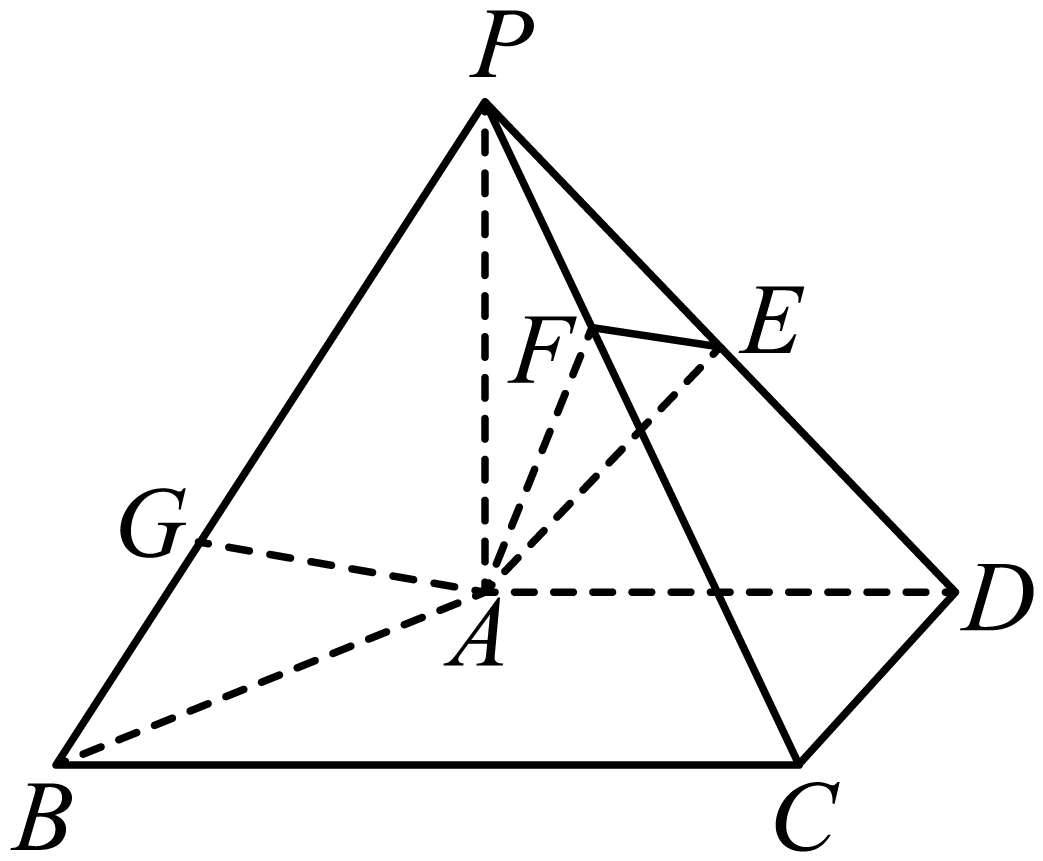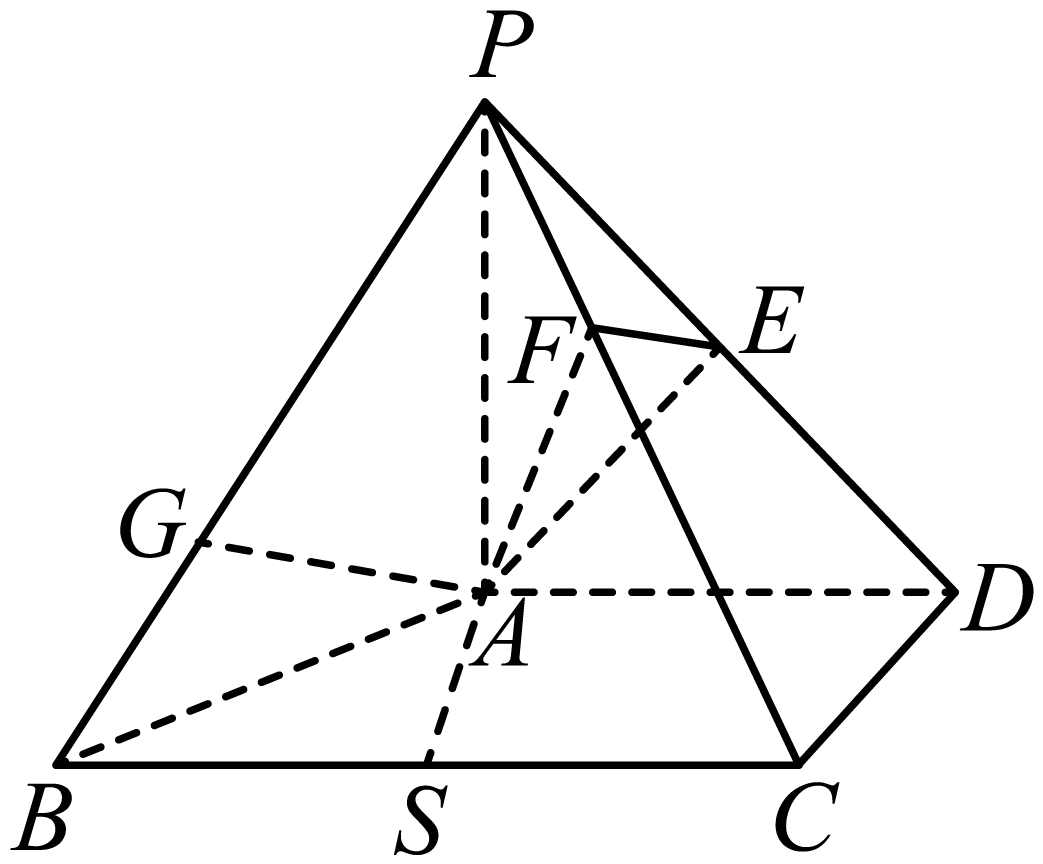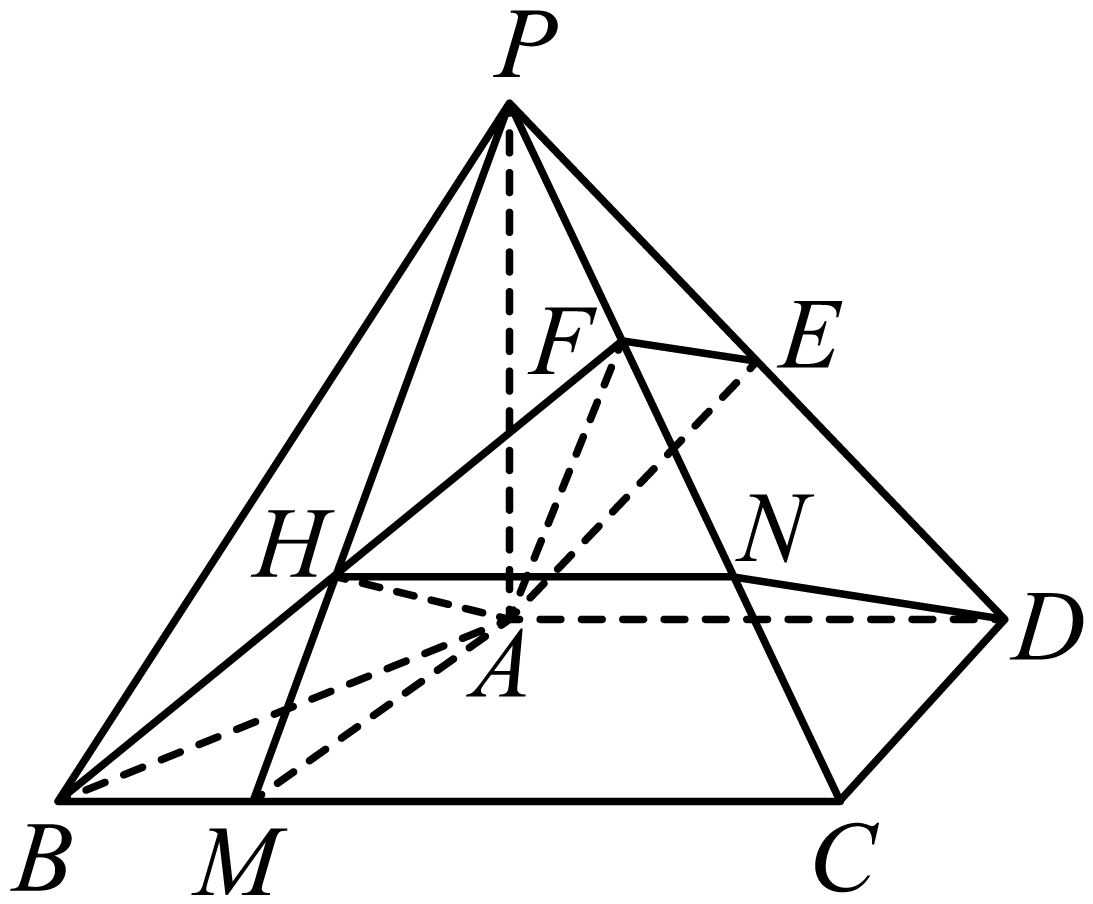| 6.5.1 直线与平面垂直 题目答案及解析
稿件来源:高途
| 6.5.1 直线与平面垂直题目答案及解析如下,仅供参考!
必修二
第六章 立体几何初步
6.5 垂直关系
6.5.1 直线与平面垂直
如图,在四棱锥${{P}-{ABCD}}$中,平面$P A B \perp$平面$ABCD$,$AD\perp CD$,$AD\text{//}BC$,$PA=AD=CD=1$,$BC=2$,$PB=\sqrt{3}$.$E$为${ {PD}}$的中点,点$F$在$PC$上,且$\dfrac{PF}{FC}=\dfrac{1}{2}$.
$(1)$求证:$PA\perp $平面$ABCD$;
$(2)$在棱$BP$上是否存在点$G$,使得点$G$到平面$AEF$的距离为$\dfrac{\sqrt{3}}{9}$,若存在求出点$G$的位置,不存在请说明理由.

$(1)$证明见解析;$(2)$靠近$B$的三等分点
"]]$(1)$取$BC$的中点$S$,连结$AS$,则四边形$ASCD$是正方形,

则$AS=BS=1$,$AS\perp BS$,
$\therefore AB=\sqrt{2}$,且$PA=1$,$PB=\sqrt{3}$
$\therefore P{{A}^{2}}+A{{B}^{2}}=P{{B}^{2}}$,
$\therefore PA\perp AB$,
$\because $ 平面$P A B \perp$平面$ABCD$,平面$P A B \cap$平面$A B C D=A B$,$PA$在面$PAB$内,
$\therefore PA\perp $平面$ABCD$;
$(2)$在$BC$上取点$M$,使$CM=\dfrac{3}{2}$,连结$PM$,在$PM$上取点$H$,使$\dfrac{MH}{MP}=\dfrac{1}{3}$,

在$PC$上取点$N$,使$\dfrac{CN}{CP}=\dfrac{1}{3}$,连结$HN$,则$HN//BC$,且$\dfrac{HN}{MC}=\dfrac{2}{3}$,则$HN=1$,
即$HN//BC//AD$,且$HN=AD$,
则四边形$AHND$是平行四边形,
$\therefore AH//ND$,且$\dfrac{AF}{FN}=\dfrac{AE}{ED}$,即$EF//ND$,
则$EF//AH$,
$\therefore $ 四点$A$,$E$,$F$,$H$四点共面,连结$BH$,
$\overrightarrow{PH}=\dfrac{2}{3}\overrightarrow{PM}=\dfrac{2}{3}\left( \overrightarrow{PB}+\overrightarrow{BM} \right)=\dfrac{2}{3}\left( \overrightarrow{PB}+\dfrac{1}{4}\overrightarrow{BC} \right)$
$=\dfrac{2}{3}\left[ \overrightarrow{PB}+\dfrac{1}{4}\left( \overrightarrow{PC}-\overrightarrow{PB} \right) \right]=\dfrac{1}{2}\overrightarrow{PB}+\dfrac{1}{6}\overrightarrow{PC}$
$=\dfrac{1}{2}\overrightarrow{PB}+\dfrac{1}{2}\overrightarrow{PF}$,
$\because \dfrac{1}{2}+\dfrac{1}{2}=1$,
$\therefore $ 点$H$,$B$,$F$三点共线,
$\therefore A$,$E$,$F$,$H$,$B$五点共面,即$BP$与平面$AEF$交于点$B$,
由$(1)$可知,$PA\perp $平面$ABCD$,$CD\subset $平面$ABCD$,
$\therefore PA\perp CD$,且$AD\perp DC$,$PA\cap AD=A$,且$PA,AD\subset $平面$PAD$,
$\therefore CD\perp $平面$PAD$,$AE\subset $平面$PAD$,
$\therefore CD\perp AE$,
且$\triangle PAD$是等腰直角三角形,点$E$为${ {PD}}$的中点,
$\therefore AE\perp PD$,且$CD\cap PD=D$,$PD$,$CD\subset $平面$PCD$,
$\therefore AE\perp $平面$PCD$,
${{S}_{\triangle DEF}}=\dfrac{1}{6}{{S}_{\triangle PCD}}=\dfrac{1}{6}\times \dfrac{1}{2}\times PD\times CD=\dfrac{\sqrt{2}}{12}$,
$\therefore {{V}_{A-DEF}}=\dfrac{1}{3}\times {{S}_{\triangle DEF}}\times AE=\dfrac{1}{3}\times \dfrac{\sqrt{2}}{12}\times \dfrac{\sqrt{2}}{2}=\dfrac{1}{36}$,
$PE=\dfrac{\sqrt{2}}{2}$,$PF=\dfrac{1}{3}PC=\dfrac{\sqrt{3}}{3}$,$\cos \angle DPC=\dfrac{\sqrt{2}}{\sqrt{3}}=\dfrac{\sqrt{6}}{3}$,
$\therefore E{{F}^{2}}=P{{E}^{2}}+P{{F}^{2}}-2PE\cdot PF\cdot \cos \angle DPC=\dfrac{1}{6}$,即$EF=\dfrac{\sqrt{6}}{6}$,
$\because AE\perp EF$,
$\therefore {{S}_{\triangle AEF}}=\dfrac{1}{2}\times AE\times EF=\dfrac{1}{2}\times \dfrac{\sqrt{2}}{2}\times \dfrac{\sqrt{6}}{6}=\dfrac{\sqrt{3}}{12}$,
设点$D$到平面$AEF$的距离为$h$,则${{V}_{D-AEF}}={{V}_{A-DEF}}$,
即$\dfrac{1}{3}\times \dfrac{\sqrt{3}}{12}\times h=\dfrac{1}{36}$,
$\therefore h=\dfrac{\sqrt{3}}{3}$,
$\because $ 点$E$是${ {PD}}$的中点,
$\therefore $ 点$P$到平面$AEF$的距离也是$\dfrac{\sqrt{3}}{3}$,
若点$G$到平面$AEF$的距离为$\dfrac{\sqrt{3}}{9}$,则$\dfrac{\dfrac{\sqrt{3}}{9}}{\dfrac{\sqrt{3}}{3}}=\dfrac{BG}{BP}=\dfrac{1}{3}$,
$\therefore $ 存在点$G$,使得点$G$到平面$AEF$的距离为$\dfrac{\sqrt{3}}{9}$,点$G$为靠近点$B$的三等分点.
| 6.5.1 直线与平面垂直题目答案及解析(完整版)
